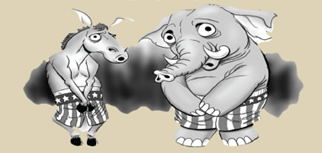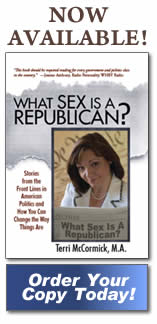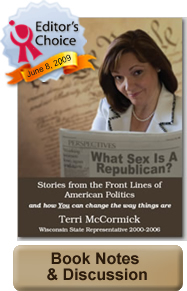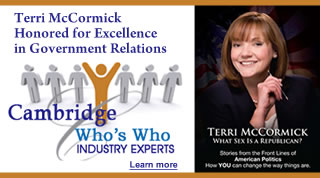
The McCormick Standard serves as a benchmark for citizen leaders to exchange ideas and share solutions to issues facing us in education, energy, the economy, justice and politics.
The United States Constitution and the rule of law is our American governing principle. It is in this tradition and its call for integrity leadership that the McCormickStandard.com was created. The McCormick Standard serves as a benchmark in the public debate on how best to get our government and economy back on track. Our nation has veered off course from its founding principles and documents. As a consequence, the American people have become vulnerable to economic hardship and government malpractice. It is time for all of us to do something about it.
The McCormick Standard relies on the rule of law and the role of a free press in preserving our republican form of government.
The Rule of Law is based on the fact that the United States Constitution is the supreme law of the land. It presumes that all men and women are equal and have certain inalienable rights. It further protects the American people from the tyranny of an oppressive government. And finally, the rule of law distinguishes human beings from the animus of a lawless society.
The abuse of power and political corruption of our nation’s politicians have done little to ensure the checks and balances of our three branches of government. Further the corporate abuse of power enabled by a lack of oversight by dysfunctional office holders must be held accountable by the American people. A fully functioning judicial, legislative and executive system of government must be put back in place. And a free and appropriate press must renew its commitment to the American public as purveyors of truth, not simply spinners of webs.
For this principle to work we must use checks and balances at the ballot box and in the appellate court system to guarantee a return to the rule of law and ethical conduct. Simply, the American public must educate itself on the issues with many sources of medium and then make their voices known during elections. All three branches of government on all levels of government work for ‘we the people’ they are; The Justice System –the ‘triers of fact’ (judges), ‘officers of the court’ (attorneys; defense, plaintiff, prosecutors, district attorneys, and public defenders), and law enforcement. Second, is the Legislative Branch – those who write the laws; local governments, state legislators, and congress. Third are those who execute the law; county executives, governors, the president.
All publicly elected office holders must understand that they are not above the law rather they must fear, honor and hold themselves accountable to the rule of law.
- No citizen, public or private shall be above the law of the United States of America.
- Investigators must be publicly accountable for their actions and held accountable for their actions – private investigators must be transparent to the county boards, state legislatures and federal congressional representatives so that we may properly hold them accountable for their actions.
- Prosecutors, District Attorneys, Sheriffs, Law Enforcement all; shall have no ‘conflict of interest’ in investigating cases, pursuing cases, or trying cases. The rule of law requires that publicly elected and appointed individuals shall hold them accountable under the law for their actions which put innocent citizens at risk abridging their rights under the law. The oversight of these actions is entrusted to a free press and an educated citizenry.
- Legislators and Congressmen and women must disclose personal and professional conflicts of interests to the American people. Public servants must be accountable to the people they serve as is written under the rule of law by the United States Constitution.
- TERM LIMITS must be enforced on all levels of government service. The United States is a constitutional government put in place to guarantee ‘self rule.’ A citizen led government should not be dependent on those who have made a business out of securing an office, while failing to perform their duties in office.
- Checks and Balances must be preserved and maintained above short term political gain. To this end ALL contributors to political campaigns must be disclosed to the American public especially those that have used the ‘527’ organization designation. (organizations with undisclosed contributors used to ‘educating the public’ typically with attack ads)
The Role of a Free Press is to ‘Seek Truth’ and to ‘Safeguard our democratic republic.’
WARNING: When the press confuses its primary role of truth seeking – with its corporate role of satisfying major stock holders, advertisers and foundation partners- it could have a dangerous effect on its bottom line circulation and readership.
An ethical press is governed by the standards and principles set forth by the Society for Professional Journalists Code of Ethics http://www.spj.org/ethicscode.asp
The sacred role of the press as ‘truth seekers’ has been questioned to the point of the collapse of the newspaper industry. Instead, the American people themselves have become the ‘truth seekers’ in their own search for credible news stories. With unlimited access to national newspapers written by world class writers online, the American public is in charge of what they read and when they read it. The New York Times, Wall Street Journal, and Washington Post to mention a few … are at the finger tips of old and young alike.
The news paper industry has become a casualty of the success of the internet, and a growing technologically literate public. As fact checking becomes a hobby for many Americans online, the quality and research of local news reporting must increase to keep pace with the competition. News spin and bias online, has become easily deleted by the touch of a button.
The responsibilities of the press are threefold;
- To ensure that the checks and balances of our three branches of government are in tact and functioning. ( checks and balance effectiveness, conflicts of interest, integrity in office, votes and policy decisions, public policy agendas, local and regional impact stories)
- To ensure ‘truth’ is the primary goal of all news stories. Tantalizing headlines written to create conflict between unsuspecting parties has exhausted the public who are seeking solutions to their problems. Too often news stories reflect the bias of corporate stockholders, board members, and advertisers. The consequence of which is distrust among readers.
- To report the inner workings of government in a transparent and unbiased manner as the fourth branch of government. The Society for Professional Journalists sets the essential standards of conduct for the media. To the extent that the American people must have credible news sources in order to carry out the role of citizen, ethical codes of conduct must be followed by the media. Further in the present day culture of corruption, it maybe necessary to enforce a code of ethics for journalists and editors.
DISCUSSION OF THE PROFESSIONAL JOURNALIST CODE OF ETHICS:
According to the Society of Professional Journalists thousands of journalists voluntarily submit to the Code of Ethics of their professional organization. Some do Not – lets take a look at their discussion as posted on;
http://www.spj.org/ethicscode.asp
As posted in its entirety:
Why doesn’t SPJ enforce its Code of Ethics?
The Society of Professional Journalists’ Code of Ethics is voluntary. We do not have a mechanism for investigating complaints or enforcing discipline on SPJ members, much less other journalists. But our code does provide a framework to evaluate ethical behavior, and we encourage fellow journalists and the public to hold news reports and commentary up to ethical scrutiny. Ultimately, that is the most effective antidote to questionable reporting, not quasi-judicial proceedings. The reasons for this emphasis are rooted in the special nature of journalism and the need to preserve freedom of expression and an independent press.
The Society’s leadership has debated the question of enforcement off and on for decades. The majority has felt that establishing a quasi-judicial system, such as those found in some other professions, would inevitably lead to actions by governments, courts or their proxies that would restrict the rights to free speech and free press guaranteed by the First Amendment to the U.S. Constitution.
Preserving those rights is a fundamental mission of SPJ — every bit as important to its members as sound ethics — and we don’t want the pursuit of the one to have a negative effect on the other. American citizens’ constitutional rights to free speech and a free press are vulnerable, and they are placed in jeopardy whenever we allow them to be confused with or limited by the professional responsibility to act ethically. Instead, we encourage the exposure of unethical journalism as a means for rooting it out; more speech is the most effective counter measure.
In addition, as a practical matter, professional enforcement of standards for news reporting would require a body of more detailed provisions and case law that are far beyond our resources to provide, even if it were desirable.
Nor could any set of rules, however detailed, possibly apply to all the nuances and ambiguities of legitimate expression. Rather, we are committed to encouraging the profession and the public to evaluate all reporting and reportage in ethical terms, not to apply “rules.” We believe our code provides the guidelines to make that possible.
We realize — and have embodied in our code — that all journalism ethics is a balancing act between often conflicting responsibilities. One of our guiding principles, whose importance we all recognize, is “Seek truth and report it.” Another is “Minimize harm.” Obviously, if one reports all truths without flinching, we will inevitably do great harm, and if one minimizes harm as much as possible, one will not be reporting essential truths. The key is in the balancing act — and in recognizing the importance of each core value. That’s not easy to enforce.
Similar conflict exists between our other two basic principles, “Act independently” and “Be accountable.”
So the Society has long felt that the best enforcement is in publicizing, explaining and applying those principles and weighing alternatives, as individuals, as journalists and as an organization, in the form of comment and opinion, without issuing definitive, quasi-legal judgments that might be put to improper use. Our hope is that the public and other journalism professionals will have in our code the tools necessary to evaluate journalism behavior and hold journalists ethically accountable for their actions. Indeed, the code specifically calls on journalists to “clarify and explain news coverage and invite dialogue with the public over journalistic conduct,” to “encourage the public to voice grievances against the news media” and to expose unethical practices of journalists and the news media.”
SPJ’s Code of Ethics has proved to be an important reference for professionals, students and citizens. It is widely consulted and applied in newsrooms and classrooms as the definitive statement of our profession’s highest values and a helpful way to think about the specific and unique journalism quandaries we confront daily.
The Society has taken measures to encourage broader use of the code. We have disseminated the text widely and organized countless programs to assess ethical issues, and we have entered into a partnership with Bloomberg to teach ethics to professionals. We have established Ethics in Journalism Week as a means of placing a spotlight on our ethical responsibilities and reaching out to the communities we serve with information on what citizens have a right to expect from journalists. We also regularly make ourselves available to the news media to comment about demonstrably good and notably bad ethical practices and the complex evaluation of responsibilities that ethical behavior demands.
When was the code adopted?
The present version of the code was adopted by the 1996 SPJ National Convention, after months of study and debate among the Society’s members. Sigma Delta Chi’s first Code of Ethics was borrowed from the American Society of Newspaper Editors in 1926. In 1973, Sigma Delta Chi wrote its own code, which was revised in 1984, 1987 and 1996.



